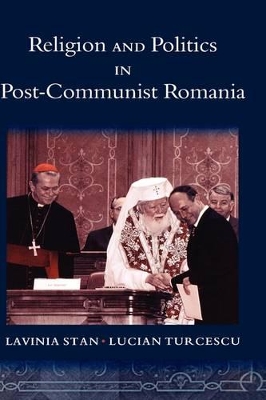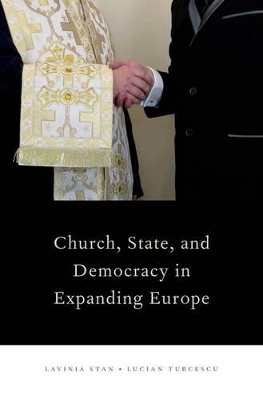Religion and Global Politics
2 total works
Religion and Politics in Post-Communist Romania
by Lavinia Stan and Lucian Turcescu
Published 1 September 2007
In the post-communist era it has become evident that the emerging democracies in Eastern Europe will be determined by many factors, only some of them political. Throughout the region, the Orthodox, Roman Catholic, and Greek Catholic churches have tried to impose their views on democracy through direct political engagement. Moreover, surveys show that the churches (and the army) enjoy more popular confidence than elected political bodies such as parliaments. These
results reflect widespread disenchantment with a democratization process that has allowed politicians to advance their own agendas rather than work to solve the urgent socio-economic problems these countries face. In this penetrating study, Lavinia Stan and Lucian Turcescu investigate the interaction
of religion and politics in one such country, Romania. Facing internal challenges and external competitions from other religions old and new, the Orthodox Church in Romania has sought to consolidate its position and ensure Romania's version of democracy recognizes its privileged position of "national Church", enforcing the Church's stances on issues such as homosexuality and abortion. The post-communist state and political elite in turn rely on the Church for compliance with educational and
cultural policies and to quell the insistent demands of the Hungarian minority for autonomy.
Stan and Turcescu examine the complex relationship between church and state in this new Romania, providing analysis in key areas: church collaboration with communist authorities, post-communist electoral politics, nationalism and ethno-politics, restitution of Greek Catholic property, religious education, and sexual behavior and reproduction. As the first scholars to be given access to confidential materials from the archives of the communist political police, the notorious Securitate,
Stan and Turcescu also examine church archives, legislation, news reports, and interviews with politicians and church leaders. This study will move the debate from common analyses of nationalism in isolation to more comprehensive investigations which consider the impact of religious actors on a
multitude of other issues relevant to the political and social life of the country.
results reflect widespread disenchantment with a democratization process that has allowed politicians to advance their own agendas rather than work to solve the urgent socio-economic problems these countries face. In this penetrating study, Lavinia Stan and Lucian Turcescu investigate the interaction
of religion and politics in one such country, Romania. Facing internal challenges and external competitions from other religions old and new, the Orthodox Church in Romania has sought to consolidate its position and ensure Romania's version of democracy recognizes its privileged position of "national Church", enforcing the Church's stances on issues such as homosexuality and abortion. The post-communist state and political elite in turn rely on the Church for compliance with educational and
cultural policies and to quell the insistent demands of the Hungarian minority for autonomy.
Stan and Turcescu examine the complex relationship between church and state in this new Romania, providing analysis in key areas: church collaboration with communist authorities, post-communist electoral politics, nationalism and ethno-politics, restitution of Greek Catholic property, religious education, and sexual behavior and reproduction. As the first scholars to be given access to confidential materials from the archives of the communist political police, the notorious Securitate,
Stan and Turcescu also examine church archives, legislation, news reports, and interviews with politicians and church leaders. This study will move the debate from common analyses of nationalism in isolation to more comprehensive investigations which consider the impact of religious actors on a
multitude of other issues relevant to the political and social life of the country.
Church, State, and Democracy in Expanding Europe
by Lavinia Stan and Lucian Turcescu
Published 1 September 2011
Lavinia Stan and Lucian Turcescu examine the relationship between religion and politics in ten former communist Eastern European countries. Contrary to widespread theories of increasing secularization, Stan and Turcescu argue that in most of these countries, the populations have shown themselves to remain religious even as they embrace modernization and democratization.
Church-state relations in the new EU member states can be seen in political representation for church leaders, governmental subsidies, registration of religions by the state, and religious instruction in public schools. Stan and Turcescu outline three major models: the Czech church-state separation model, in which religion is private and the government secular; the pluralist model of Hungary, Bulgaria and Latvia, which views society as a group of complementary but autonomous spheres - for
example, education, the family, and religion - each of which is worthy of recognition and support from the state; and the dominant religion model that exists in Poland, Romania, Estonia, and Lithuania, in which the government maintains informal ties to the religious majority.
Church, State, and Democracy in Expanding Europe offers critical tools for understanding church-state relations in an increasingly modern and democratic Eastern Europe.
Church-state relations in the new EU member states can be seen in political representation for church leaders, governmental subsidies, registration of religions by the state, and religious instruction in public schools. Stan and Turcescu outline three major models: the Czech church-state separation model, in which religion is private and the government secular; the pluralist model of Hungary, Bulgaria and Latvia, which views society as a group of complementary but autonomous spheres - for
example, education, the family, and religion - each of which is worthy of recognition and support from the state; and the dominant religion model that exists in Poland, Romania, Estonia, and Lithuania, in which the government maintains informal ties to the religious majority.
Church, State, and Democracy in Expanding Europe offers critical tools for understanding church-state relations in an increasingly modern and democratic Eastern Europe.

